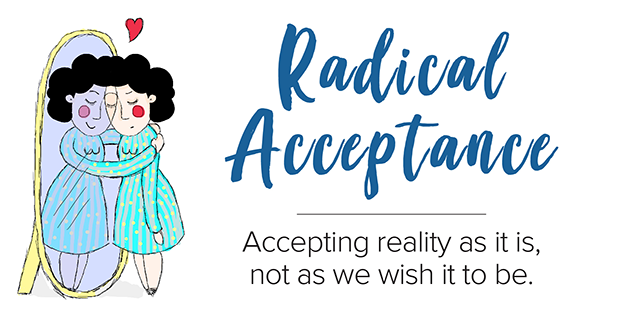
Radical acceptance: Accepting reality as it is, not as we wish it to be.
This links to the core dialectic of Dialectical Behavior Therapy: acceptance vs. change. We accept the things that we cannot change and we change the things that we can. We also accept the things that are true now . . . even if we plan to change them. We accept things as they are and we change things to make them better. Both can be true at the same time.
Some phrases and self-talk that emphasize acceptance include:
“It is what it is.”
“We have to make the best of it.”
“We can’t change it; we just have to get through it.”
“That’s the way he/she is.”
“It happens.”
Phrases that indicate non-acceptance include:
“This never would have happened if . . . “
“I can’t believe this is happening!”
“What did I do to deserve this?!”
“Why does he/she always do/say that?!”
Marsha Linehan uses the word “suffering” to describe the outcome of non-acceptance. While many situations can be very bad and feel like suffering, Marsha Linehan wanted to illustrate that non-acceptance of the situation makes it worse. She designates the word, “suffering” to describe the outcome of non-acceptance.
In other words, the situation causes pain (which may be a lot). Non-acceptance of the situation adds to the pain and causes suffering. Therefore, practicing acceptance reduces the suffering back to the original pain.